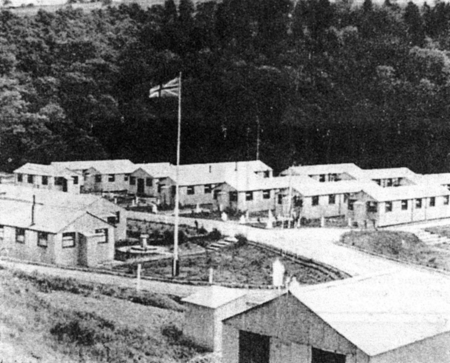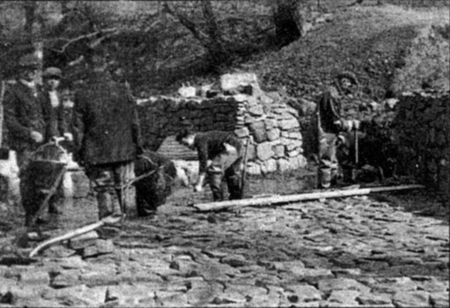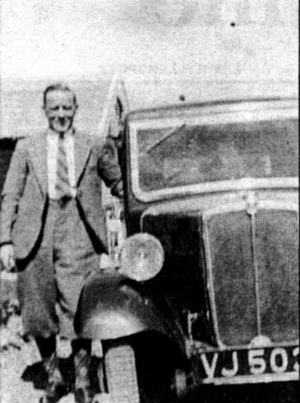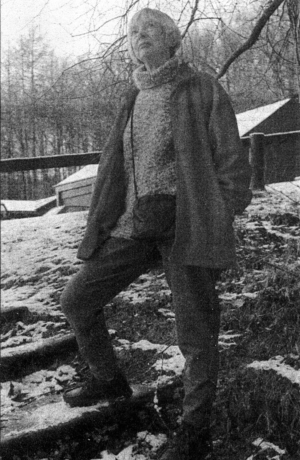
(Transcript of article in The Northern Echo 12.1.2000)
"I have discovered today a secret valley in County Durham where men who have grown grey and old under the burden of unemployment find new life and a hope in the future," cooed a Special Representative of the North Mail newspaper in 1936. "Hidden in a sylvan trough beside a beck which flows into the River Wear, more than 200 men are being trained to remember what work is like, and to find satisfaction in an eight-hour shift."
The sylvan trough is now Hamsterley Forest and the men who found satisfaction from shiftwork were on an extraordinary work experience scheme that was a curious mixture of It Ain't Half Hot Mum and a military field camp. Sixty years on, only the barest details remain of what went on at Hamsterley but , with the help of a camp commandant's daughter, the Forestry Commission is trying to piece together a more complete story.

That story begins with the formation of the Commission in 1919. The Great War was over and, after centuries of war and industrial development, Britain had been reduced to relying on timber imported from Canada and Russia to fuel its fighting machine and to prop up its pits.
The Commission was ordered to replenish the nation's timber supply and in 1927 it bought Hamsterley from the Surtees family of Redworth Hall.
But manpower was required to transform Hamsterley from a hunting estate to a working woodland, and during the economic depression of the early 1930s, the Ministry of Labour joined forces with the Commission to create employment.
Because the depression was hitting the Durham coalfield hardest, most of the men who came to Hamsterley were from mining communities. They arrived, 50 at a time, by train at nearby Witton-le-Wear station to begin their three-month course.
The men who enter the valley are cut off from their homes, but in ....those three months their muscles and hands, softened by lack of work for [years] become hard and strong," en...d the man from the Mail.
[The day] began at 6 a.m. with Morning Reveille - although when Arthur Rendle {should be Albert} was camp manager in 1936-7, the cool sounds of hot jazz woke up the residents. "The manager is a believer in hot jazz ... sluggish liver;" said the North Mail., a now defunct newspaper.. "When the [men] attend the camp they find the 6am [...] their hardest task, but hot jazz is [turned] on and in few moments that 'morning after' feeling, engendered by [years] of unemployment and late rising [.....]."
Ready to face the day, the men breakfast in the dining hall (another of Mr Rendle's innovations was that breakfast would be accompanied by popular music) before returning to their Hi-de-Hi-style [huts to] prepare for inspection.
They fell in at 8am for morning parade and then the day's work began. They were split into gangs and sent out into the [....]. Some went "knapping" - stone-breaking in the quarry; others went road-making, trenching, clearing or planting. At 4.30pm, they returned to their huts, ready for evening meal at 6.30pm. Then came the evening's entertainment in the recreation hut which had a piano and a stage shaped like a ship's deck. To complete the nautical feel, a lifebelt was hung on the stage backdrop. On it was written the name of the "ship": "SS Happy Hamsterley".
The men played darts, dominoes and table tennis for prizes which included Woodbine cigarettes. In good weather there was football and swimming outside. In bad weather, lecturers came from Durham and Newcastle universities to discuss topics like the planets. Local bands and concert parties also came to SS Happy Hamsterley, and the men themselves organised their own shows.
Eve Rendle, daughter of the camp manager who is researching the history, says:"My father said the men had a really good spirit about them and when they did their own concerts they came up with their own material."
But what sort of men were they? They were obviously the long-term unemployed. The North Mail reporter wrote:"One tanned worker told me with enthusiasm:'I like it fine, I get a bit lonely without the wife and kiddies, but if I get work when I leave here, it will be a God-send to me, for I haven't done a day's work for 11 years'."
But there is also a suggestion in the article that the men were chosen because they were physically run-down. Malcolm Stewart, the Government's Commissioner for the Special Areas, whose visit to the camp coincided with the reporter's, said:"The best evidence of the nature of the treatment they receive is that many of them put on a stone in three months."
When the course started in 1934, attendance was voluntary, although later it probably became compulsory. The men received 17s a week pay, but after deductions for food, accommodation and clthing (corduroy trousers and workshirts) they were left with four shillings. When the course ended, the men returned to civilian life, 26 per cent of them finding permanent employment. Many were so happy at Hamsterley they asked to stay.

There were also many local people employed on the site as cooks, orderlies and [....]ders. "The camp gave a good feel-... local community because they came to the concerts," says Eve Rendle "the men weren't alienated."
Her father, Albert, was a Sergeant-Major in the First World War and had fought on the Somme, but was .... to make the camp too militaristic, hence the hot jazz. Before and after Hamsterley he worked at some of the 35 ..... camps that the Forestry Commission ran across the country, and he was awarded an MBE in 1952.
Because so little is known about the [camp] Eve is appealing to readers of The Northern Echo who have memories or knowledge of Hamsterley during this period to write in.
The camp was a short-lived experiment [for] with the outbreak of the Second World War even the impoverished, long-term unemployed from Durham were required elsewhere. German prisoners of war, bussed in from Harperley PoW camp near Crook, took over the forestry ... they might have been assisted by Wesley boys - conscientious objectors.
......the last PoWs repatriated, the camp was wound down in the early 1950s. The Forest Visitors' Centre is today in the .... hut and some offices are in a dormitory but most of the holiday camp huts were sold to local farmers to use them as hen houses in the 1960s.
Perhaps, clinging to the last hut as it was towed away behind a tractor was the Noth Mail's enthusiatic Special Representative. He headlined his article "Val[ley of Y]outh found found in Durham" and concluded it by saying:"When I am tired of [....]sm, I shall book a single ticket for "Happy Hamsterley" to revive my soul.


Albert Rendle Eve Rendle
I found Chris Lloyd's article, Finding Hope in Happy Hamsterley (Echo Jan 12) very interesting indeed. It brought back my happy days spent in an identical labour camp in 1934.
The forestry training scheme was just getting off the ground and had been set up in several locations. I was called to the labour exchange and told that I had the option of signing up for three months training or no benefit. Jobs were few and far between in Hartlepool, so I signed up. I was kitted out with work clothes, boots socks and towels. I requested trying Hamsterley but was told it was fully booked up. They gave us a warrant card and off we went to Brandon in Suffolk. I was 17 at the time.
All the huts were new and made of shiney coorugated iron cladding. The Union flag flew in the centre of the lawn. We were introduced to the manager and staff, shown to our hut that would be home for 13 weeks. Each bed had a locker with a padlock for personal possessions.
Some of the intake had pyjamas and best clothes for Sundays, obviously of gentry stock. The novelty of hot water at the taps and showers was a luxury for many of us that had taps and WCs out in the yard. This was life with a purpose.
We had 20 occupants to each hut all from different regions and walks of life. Many had served in World War one and would relate experiences which put me off joining up as a volunteer. Many were talented singers, comics, conjurers, card sharps - one chap could swallow his tongue and bring it back at will.
We formed gangs and learned the skills of drain laying, trenching and .mbering up to safety standards, many worked with the Forestry Commission planting and making fire roads.
Of course we had whingers and growlers saying this was slavery on the cheap, mostly those with union experience. Some had been out of work so long that idleness was a way of life and they would lounge about waiting for pay day.
We had four shillings pocket money, it meant a packet of Woodbines every day at tuppence a packet, two nights at thye cinema at sixpence a trip, two pints of scrumpy on Saturday and one on Sunday at fourpence a pint, total expenditure for the week two shillings and ten pence leaving one shilling and tuppence for cards and the odd razor blade. Take my word for it, scrumpy was a powerful concoction at fourpence a pint.
After a month, the married with wife and kids at home developed homesickness but the unatttached were settling nicely. To us young lads it all seemed like an adventure with possibly a job at the end of our training., and eventually three of us mates had a job offered at the Morris motor works in Oxford, but a few months later along came that man Hitler. He gave all of us a job. I often think that my training under the Labour Scheme gave me sight of a life in the service which lasted almost seven years.
Now in my 83rd year, I am still going strong.
GW Bainbridge, Hartlepool.
(When Mr Bainbridge was at Brandon, the camp manager was Albert Rendle. Mr Rendle moved to manage Hamsterley a couple of years later.)
I enjoyed the article on Hamsterley Forest because my grandfather has a small farm nearby at High House. We would get off the OK bus or Featherstones' little rattler in Hamsterley then walk to the farm. I remember back in the 1940s hearing the bugle sound, Come to the Cookhouse Door Boys, from somewhere miles away down in the forest. We never went down to the forest - not right down to the bottom as we were very young and it was miles to walk. We got as far as Top Road and filled our jars with rasps from the roadside. The raspberry pie was mouth-watering. Even now when I taste the first raspberry from my allotments the memories come flooding back. The was Colours the kitten, Meg the sheepdog, the baby wild rabbit in a hutch, the squeal of a pig getting a ring put in its nose, flies round the horse's head, hay seeds, dancing on the hay wagon etc, meals in the hay field, not forgetting the traction engine on thrashing day which blew chaff 'arl ower'. G. Webster, Darlington.
I lived in Witton-le-Wear from 1927 to 1952 and can well remember in the early days of the Second World War naval cadets being evacuated from the Sunderland area to Hamsterley camp to continue their training.
We were told that these boys were originally Borstal boys. When a Church Parade was held they all marched to Hamsterley Church and the band and drums could clearly be heard at Witton-le-Wear. Some of these cadets were confirmed at Witton-le-Wear Church around 1940 to 1941.
The Wesley boys referred to lived in a hostel at Toronto, near Bishop Auckland, together with other men unfit for National Service who worked on farms in the area.
Bill Preston, Deighton, Northumberland.
I remember as a young girl going with a Toc H concert party to entertain at Bedburn camp. There were young unemployed men who were working in the forest. We had supper and I remember the scrubbed wooden tables, a dish of apples and pickled onions, home boiled ham sandwich and strong, sweet tea.
Ethel Hand, Bishop Auckland
I lived at Hamsterley until I married and my uncle arrived at the camp in 1927 as the first Forestry Commissioner to work with the unemployed.
He was still at the camp in 1929 as my mother and myself were invited to the official opening of the camp by the Queen Mother and the late King George VI. I was too young to realise the significance of the visit by the Royals, but I do remember it was a very special day.
The Wesley boys referred to in the article were not conscientious objectors, but evacuated from Blyth naval training establishment for young offenders. When they completed their sentence some joined the armed services.
They paraded to St James's Church dresed in sailor uniforms identical to the Royal Navy. A Captain Cooke was in charge.
The boys worked outside the camp if they were of good behaviour and not likely to abscond.
When the Prisoners of War came to Harperley camp during the war they also worked in Hamsterley. One of them, a young German boy called Augustin, practically became one of our family. He was a very hard worker and likeable young man. I fact, he was loathe to return to his homeland when the war ended.
The PoWs built a swimming pool opposite the visitors centre in the camp.
Name and address supplied.
I read the article with interest because I have different views of a camp of that time. I was born in 1928 in Kirk Merrington and my father had been out of work since 1926. Things were grim in those days as my father was to stay unemployed until late in 1936, apart from brief periods when he was dragged away from his home to do road work just to teach him a lesson.
In 1936 all around County Durham the county council had instigated a series of schemes under the Land Resettlement Agency. They consisted of a smallholding between five and ten acres of land. The biggest, the one we went to, was in Eaglescliffe, near Preston Park.
The houses were brand new, a flush toilet was added later and we were stocked with chickens and pigs and a small Dutch lights. The hens were free to range and we were under contract to sell the eggs to Stockton Co-operative Society.
We had goats of our own and a quarter of an acre ploughed up which was for our own use because there were no wages. We were self supporting and all profits, egg sales, pig sales were to be paid to the Durham County Council. I write to tell you this because at the age of eight I was plunged into poverty and slave labour in a camp was designed to keep the pre-war working class right there in their place.
Name and address supplied, Cleveland.